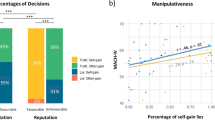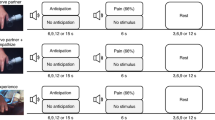Abstract
Empathy enables us to understand and share the emotional and affective states of another person and plays a key role in social behaviors. The current study investigated whether and how empathic neural responses to pain were modulated by the perceived reputation of others. Action histories reflecting individuals’ past cooperation or betrayal actions in the repeated prisoner’s dilemma game were introduced as an index of reputation. We assessed brain activity with functional magnetic resonance imaging while the participants observed individuals with a good or bad reputation receiving or not receiving pain. The results indicated that the participants exhibited reduced empathic responses in AI and dACC to the individual who had a bad reputation relative to the one who had a good reputation, suggesting that their empathy for pain was modulated by the perceived reputation of others.


Similar content being viewed by others
References
Akitsuki Y, Decety J (2009) Social context and perceived agency affects empathy for pain: an event-related fMRI investigation. Neuroimage 47:722–734. doi:10.1016/j.neuroimage.2009.04.091
Axelrod R, Hamilton WD (1981) The evolution of cooperation. Science 211:1390–1396. doi:10.1126/science.7466396
Barclay P (2012) Harnessing the power of reputation: strengths and limits for promoting cooperative behaviors. Evol Psychol 10:868–883. http://www.epjournal.net/wp-content/uploads/EP10868883.pdf
Brett M, Anton JL, Valabregue R, Poline JB (2002) Region of interest analysis using an SPM toolbox. Neuroimage 16:1140–1141. http://matthew.dynevor.org/_downloads/marsbar_abstract.pdf
Cheng YW, Lin CP, Liu HL, Hsu YY, Lims KE, Hung D, Decety J (2007) Expertise modulates the perception of pain in others. Curr Biol 17:1708–1713. doi:10.1016/j.cub.2007.09.020
Danziger N, Faillenot I, Peyron R (2009) Can we share a pain we never felt? Neural correlates of empathy in patients with congenital insensitivity to pain. Neuron 61:203–212. doi:10.1016/j.neuron.2008.11.023
de Greck M, Shi ZH, Wang G, Zuo XY, Yang XD, Wang XY, Northoff G, Han SH (2012) Culture modulates brain activity during empathy with anger. Neuroimage 59:2871–2882. doi:10.1016/j.neuroimage.2011.09.052
Decety J (2010) To what extent is the experience of empathy mediated by shared neural circuits? Emot Rev 2:204–207. doi:10.1177/1754073910361981
Decety J (2011) Dissecting the neural mechanisms mediating empathy. Emot Rev 3:92–108. doi:10.1177/1754073910374662
Decety J, Jackson PL (2004) The functional architecture of human empathy. Behav Cogn Neurosci Rev 3:71–100. doi:10.1177/1534582304267187
Decety J, Michalska KJ, Akitsuki Y (2008) Who caused the pain? An fMRI investigation of empathy and intentionality in children. Neuropsychologia 46:2607–2614. doi:10.1016/j.neuropsychologia.2008.05.026
Decety J, Echols S, Correll J (2009) The blame game: the effect of responsibility and social stigma on empathy for pain. J Cogn Neurosci 22:985–997. doi:10.1162/jocn.2009.21266
Decety J, Chen C, Harenski C, Kiehl KA (2013) An fMRI study of affective perspective taking in individuals with psychopathy: imagining another in pain does not evoke empathy. Front Hum Neurosci 24:489. doi:10.3389/fnhum.2013.00489
Eres R, Molenberghs P (2013) The influence of group membership on the neural correlates involved in empathy. Front Hum Neurosci 7:176–181. doi:10.3389/fnhum.2013.00176
Fudenberg D, Maskin E (1986) The folk theorem in repeated games with discounting or with incomplete information. Econometrica 54:533–554. doi:10.2307/1911307
Gu X, Liu X, Guise KG, Naidich TP, Hof PR, Fan J (2010) Functional dissociation of the frontoinsular and anterior cingulate cortices in empathy for pain. J Neurosci 30:3739–3744. doi:10.1523/JNEUROSCI.4844-09.2010
Guo X, Zheng L, Zhang W, Zhu L, Li J, Wang QF, Dienes Z, Yang ZL (2012) Empathic neural responses to others’ pain depend on monetary reward. Soc Cogn Affect Neurosci 7:535–541. doi:10.1093/scan/nsr034
Han S, Fan Y, Xu X, Qin J, Wu B, Wang X, Aqlioti SM, Mao L (2009) Empathic neural responses to others’ pain are modulated by emotional contexts. Hum Brain Mapp 30:3227–3237. doi:10.1002/hbm.20742
Izuma K (2012) The social neuroscience of reputation. Neurosci Res 72:283–288. doi:10.1016/j.neures.2012.01.003
Jackson PL, Meltzoff AN, Decety J (2005) How do we perceive the pain of others? A window into the neural processes involved in empathy. Neuroimage 24:771–779. doi:10.1016/j.neuroimage.2004.09.006
Jackson PL, Brunet E, Meltzoff AN, Decety J (2006) Empathy examined through the neural mechanisms involved in imagining how I feel versus how you feel pain. Neuropsychologia 44:752–761. doi:10.1016/j.neuropsychologia.2005.07.015
King-Casas B, Tomlin D, Anen C, Camerer CF, Quartz SR, Montague PR (2005) Getting to know you: reputation and trust in a two-person economic exchange. Science 308:78–83. doi:10.1126/science.1108062
Lee SJ, Kang DH, Kim CW, Gu B, Park JY, Choi CH, Shin NY, Lee JM, Kwon JS (2010) Multi-level comparison of empathy in schizophrenia: an fMRI study of a cartoon task. Psychiatry Res 181:121–129. doi:10.1016/j.pscychresns.2009.08.003
Merriam-Webster (2015) http://www.merriam-webster.com/dictionary/reputation. Accessed 30 May 2015
Meshi D, Morawetz C, Heekeren HR (2013) Nucleus accumbens response to gains in reputation for the self relative to gains for others predicts social media use. Front Hum Neurosci 7:1–11. doi:10.3389/fnhum.2013.00439
Milinski M, Semmann D, Krambeck HJ (2002a) Reputation helps solve the ‘tragedy of the commons’. Nature 415:424–426. doi:10.1038/415424a
Milinski M, Semmann D, Krambeck HJ (2002b) Donors to charity gain in both indirect reciprocity and political reputation. Proc R Soc Lond 269:881–883. doi:10.1098/rspb.2002.1964
Mohtashemi M, Mui L (2003) Evolution of indirect reciprocity by social information: the role of trust and reputation in evolution of altruism. J Theor Biol 223:523–531. doi:10.1016/S0022-5193(03)00143-7
Molenberghs P (2013) The neuroscience of in-group bias. Neurosci Biobehav Rev 37:1530–1536. doi:10.1016/j.neubiorev.2013.06.002
Morrison I, Downing PE (2007) Organization of felt and seen pain responses in anterior cingulate cortex. Neuroimage 37:642–651. doi:10.1016/j.neuroimage.2007.03.079
Morrison I, Lloyd D, di Pellegrino G, Roberts N (2004) Vicarious responses to pain in anterior cingulate cortex: is empathy a multisensory issue? Cogn Affect Behav Neurosci 4:270–278. doi:10.3758/CABN.4.2.270
Nowak MA (2006) Five rules for the evolution of cooperation. Science 314:1560–1563. doi:10.1126/science.1133755
Nowak MA, Sigmund S (2005) Evolution of indirect reciprocity. Nature 437:1291–1298. doi:10.1038/nature04131
Preis MA, Schmidt-Samoa G, Dechent P, Kroener-Herwig B (2013) The effects of prior pain experience on neural correlates of empathy for pain: an fMRI study. Pain 154:411–418. doi:10.1016/j.pain.2012.11.014
Preston SD, de-Waal FB (2002) Empathy: its ultimate and proximate bases. Behav Brain Sci 25:1–72. http://www.psychology.emory.edu/cognition/rochat/lab/VariousKindsofempathyasrevealedbmonkeysbrain.pdf
Sigmund K (2012) Moral assessment in indirect reciprocity. J Theor Biol 299:25–30. doi:10.1016/j.jtbi.2011.03.024
Singer T, Lamm C (2009) The social neuroscience of empathy. Ann N Y Acad Sci 1156:81–96. doi:10.1111/j.1749-6632.2009.04418.x
Singer T, Seymour B, O’Doherty J, Kaube H, Dolan RJ, Frith CD (2004) Empathy for pain involves the affective but not sensory components of pain. Science 303:1157–1162. doi:10.1126/science.1093535
Singer T, Seymour B, O’Doherty JP, Stephan KE, Dolan RJ, Frith CD (2006) Empathic neural responses are modulated by the perceived fairness of others. Nature 439:466–469. doi:10.1038/nature04271
Suzuki S, Akiyama E (2005) Reputation and the evolution of cooperation in sizable groups. Proc R Soc B 272:1373–1377. doi:10.1098/rspb.2005.3072
Suzuki S, Niki K, Fujisaki S, Akiyama E (2011) Neural basis of conditional cooperation. SCAN 6:338–347. doi:10.1093/scan/nsq042
Xu X, Zuo X, Wang X, Han S (2009) Do you feel my pain? Racial group membership modulates empathic neural responses. J Neurosci 29:8525–8529. doi:10.1523/JNEUROSCI.2418-09.2009
Author information
Authors and Affiliations
Corresponding authors
Additional information
Li Zheng and Qianfeng Wang have contributed equally to this work.
Rights and permissions
About this article
Cite this article
Zheng, L., Wang, Q., Cheng, X. et al. Perceived reputation of others modulates empathic neural responses. Exp Brain Res 234, 125–132 (2016). https://doi.org/10.1007/s00221-015-4434-2
Received:
Accepted:
Published:
Issue Date:
DOI: https://doi.org/10.1007/s00221-015-4434-2




